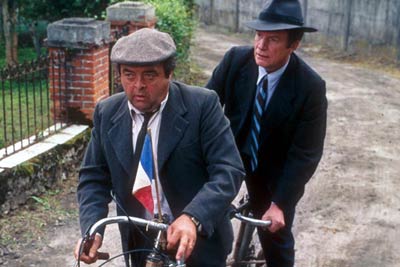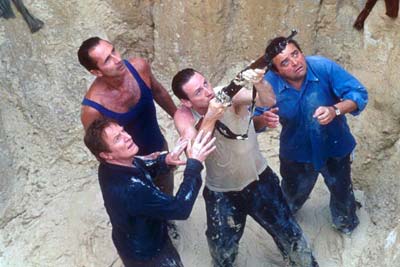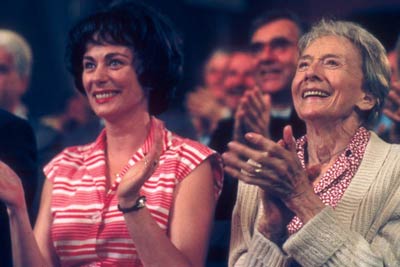Strange Gardens
Strange lack of gardens, but a touching and amusing story more than makes up for it.

Humans have been around a very long time - about 200,000 years by current estimates, but civilisation has been around for a relatively short time - it is thought to have started in Egypt around 10,000 B.C. And whatever people may see as the hallmarks of civilisation ? agriculture, an organised society, religion, education or a legal framework, there is always something that seems inextricably linked with it, and that is war. Before civilisation, we humans were mostly concerned with where the next meal was coming from, and whether we had a roof over our heads and protection from any wild animals that might be around. Once we got civilisation, and the problem of the next meal was, largely, sorted, we began to think, "wouldn't it be nice if we had their meal too?" or, "those infidels in the next valley/region/country do not worship our god, let's kill 'em all!" After that, it was only a matter of time until large groups of pale men, all wearing the same uniform and insignia, started trying to take over a continent and disposing of everyone who didn't fit with their ideals.
Little wonder, then, that with so much of our history as a species shaped by war, so many films would be made on the subject. Most, however, are concerned with battles and explosions, or the exploits of heroes (which no doubt many of the military personnel, on either side of any war in history, were). Too few films concern the other people, those who stayed at home and helped keep a country going, or were living in occupied territory, which is odd, when you think about it, as these people are by far the most numerous in any conflict. Perhaps it's because they're not 'heroes', but most people aren't - most are neither hero nor villain, they're just people, trying to get along as best they can. And they're generally scared people too. You try not being frightened when an entire infantry unit and an armoured tank division roll down the main street in your town and take over.

That most do make it through such times, and still find the ability to laugh and joke, and enjoy life, is testimony to the indomitability of the human spirit. Few films, alas, tell the story of normal people in such circumstances, though some have, the most notable of which, perhaps, is Roberto Benigni's magnificent Life Is Beautiful. Jean Becker's Strange Gardens (Effroyables Jardins) is another such film. Based on Michel Quint's hugely successful (in France) novella, Strange Gardens tells the tale of two friends, Jacques Pouzay (Jacques Villeret), a teacher, and Andre Designy (Andre Dussollier), a milliner, who committed a small act of sabotage during World War II in order to impress a woman.
The story begins some years after the end of World War II, and Jacques has a teenaged son and daughter. His son, Lucien (Damien Jouillerot), is acutely embarrassed by his dad - he performs as a clown as a hobby, but is in the habit of wearing items of his clowning gear into the classroom when he teaches, much to Lucien's chagrin. Jacques performs, under the clown name of Zozo, at the annual town fete and while he is clowning on stage, and the audience laughing riotously in the hall, Lucien is seen clearly wishing that he could exchange his father for someone less embarrassing. He is also apparently the only person in the hall with any taste - if it was funny, a clown wouldn't being do it - but if you can sit through Jacques' performance then you will be rewarded.
Meanwhile Andre, the unsuccessful hat salesman, notices young Lucien's displeasure, and takes him aside to tell him the history behind his father's clowning. We are then taken back in time to the closing months of the war in Europe, when French citizens were being urged by their compatriots in exile in Britain to commit acts of sabotage to disrupt the occupying German forces. Jacques and Andre are seen to be vying (not particularly successfully, it must be said) for the attentions of Lucien's mother, Louise (Isabelle Candelier). Hearing the BBC broadcast from the French exiles while drinking in her caf?, the two friends decide that they can impress her by blowing up the railway signal box. After the destruction of the box, the German military want someone to pay, and the men folk of the town are rounded up in the middle of the night. Four names, provided by the French 'authorities', are then read out by the Germans to be hostages, who will be executed in 24 hours if those responsible for the act of sabotage have not come forward. These four just happen to include the two saboteurs, as well as Thierry (Thierry Lhermitte), an insurance salesman with a rather grandiose perception of himself, and Emile (Benoit Magimel).

The four are thrown into a pit in the middle of a quarry, and are given no food or water. Since no one can come forward to free them, as the guilty parties are in the pit (and the other two won't let them confess as they don't believe that they did it), the future does not look particularly promising. One guard (Bernard Collins) takes pity on them, and sneaks them some food. Then, extremely unexpectedly, begins to entertain them by showing them his clowning act. It is this act of kindness, and rather more bizarre act of clowning, that prompts Jacques to become a clown when the war has ended, and keep alive the act and name of the German guard, whom they knew only as Bernd (or Zozo), who had shown him such kindness. Freed from their prison by another kindly act, this time an act of supreme sacrifice by an unforeseen victim of the sabotage, the men are released and return to their lives.
It's hard not to like Strange Gardens. It is genuinely funny in places, and touching in others. Becker has even managed to make Bernd's clowning display funny (due, largely, to the setting in which he performs it for the four hostages), which is no small feat. The director is very much helped by his two leads, Dussollier and Villeret, who have a definite chemistry on screen, which makes their petty bickering both amusing and believable. He also employs one very simple trick which has a huge effect on the impact of the film - by de-saturating the colours in the scenes in which the four men are held captive, the emotional impact is greatly increased, and the guard's red clown nose, which is the only colour that stands out, has the same level of effect in Strange Gardens as the girl in the red dress did in Schindler's List.
It would have been very easy for this film to be dripping in sentimentality, but it is for the most part emotional, rather than sentimental (with the exception of the denouement, which is so thickly smothered in sentimentality you may feel the need for an aqualung), and will mean you leave the cinema with a happy little glow.
Should my rating of this film be regarded by anyone, I'd give it 4, out of a possible 5, units of goodness.
Andre Dussollier (Andre Designy)
Thierry Lhermitte (Thierry Plaisance)
Benoit Magimel (Emile Bailleul)
Isabelle Candelier (Louise)
Bernard Collins (Bernd)
Damien Jouillerot (Lucien)